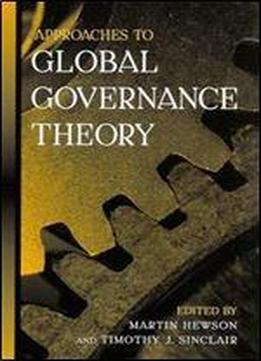
Approaches To Global Governance Theory
by Martin Hewson /
2018 / English / PDF
1.5 MB Download
As the debate over global governance heats up, Approaches to Global Governance Theory offers a guide to this new terrain. The contributors advocate approaches to global governance that recognize fundamental political, economic, technological, and cultural dynamics, that engage social and political theory, and that go beyond conventional international relations theory. We are offered here a guide to this new terrain. Beginning with a chapter tracing the emergence of global governance analysis in the 1990s, Approaches to Global Governance Theory also responds to alternative theoretical conceptions. James N. Rosenau explores the ontology of global governance. In addition, Robert Latham develops a critique of Rosenauthinking, while Michael G. Schechter examines the limits of the Commission for Global Governancewidely-publicized 1995 report and Ronen Palan asks critically, Who is to be governed by global governance? Other chapters develop analyses of global governance phenomena. Technological change is addressed by Karen T. Litfin, on environmental satellites, and Edward A. Comor, on broadcast satellites. M. Mark Amen examines developments in credit, and shifts in political identity are mapped by Yale H. Ferguson and Richard W. Mansbach. Also, developments in information and knowledge are considered by Tony Porter. In addition, chapters advocate new directions for global governance analysis. Timothy Sinclair suggests a focus on the level of the commonplace, Martin Hewson proposes long-term analysis of world order informationalism, and Ronnie D. Lipschutz makes a case for the importance of global civil society."











